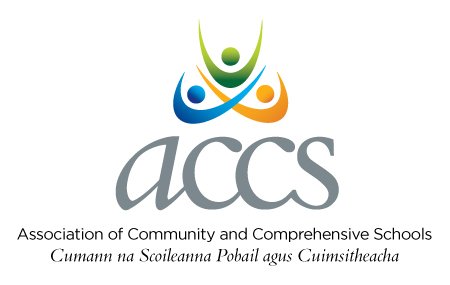School Management:
+ Trusteeship in ACCS Schools
The Education Act, 1998
The Deed of Trust for Community Schools
Instrument and Articles of Management for Comprehensive Schools
The National Trustee Forum
+ Boards of Management
Composition of Boards of Management
Appointment of a Board of Management
Termination of Membership of Boards of Management
Responsibilities of a Board of Management
School Evaluation
Specific Legislative Responsibilities
Board of Management Meetings
The Parents’ Association
The Student Council
+ The Curriculum
Curriculum Development
Junior Certificate and Junior Cycle
Senior Cycle
Guidance and Counselling
+ In School Management and Organisation
Responsibilities of a Principal
The School Year
School Plan and Policy Development
Risk Management - Good Governance
DEIS – Delivering Equality of Opportunity in Schools
Special Educational Needs
Adult and Community Education
Governance Manual for Community and Comprehensive Schools
School Records and Returns
Financial Management
Procurement for Schools
+ General Data Protection Regulation
ACCS Data Protection Policy for Schools
+ Garda Vetting
The National Vetting Bureau
Vetting of Teaching Staff
eVetting of Non Teaching Staff
Retrospective Vetting of Employees
+ State Indemnity - School Insurance
State Indemnity and the Role of SCA
State Indemnity Confirmation Statements
Work Experience
Personal Accident Insurance
Accident Reporting
Claims Management
Use of private vehicles for work
Contacting the State Claims Agency (SCA)
+ Health and Safety
Principal Health and Safety Legislation
Guidelines on Managing Safety and Health in Post Primary Schools
Use of School Equipment and Facilities - Risk Advisory Notices
Accident Reporting
Duties of the Board of Management
Fire Precautions
Disposal of Unwanted Chemical Substances
Bullying and Stress as a Health and Safety Issue
Duties of Employees
“Reasonably Practicable”
+ The Care and Management of Students
General Responsibilities of the Board of Management
Student Enrolment and Attendance
The School Code of Behaviour
Child Protection
Bullying and Harassment
Managing Chronic Health Conditions in School
Mental Health Promotion and Suicide Prevention
Parental Complaints against a Teacher
Supervision
Out of School Activities
Work Experience
Critical Incidents
Liability for Personal Property
Provision of Information to Students, Parents and Teachers
+ Religious Education and Worship
Religious Ethos of the School
Personal Suitability of Religious Education Teachers
Withdrawal of a Student from Religious Education and Worship
Religious Practice
The School Chaplain
+ ACCS Annual Convention
Convention Presentations 2018
ACCS Convention Handbook 2018
2018 Convention Handbook Contents 3
2018 Convention Handbook Contents 2
2018 Convention Handbook Contents 1
ACCS Convention 2017
Convention 2017 Presentations
eVetting of Non Teaching Staff
Last updated: Fri, Apr 27th, 2018 2:35:13 pm
ACCS is the authorised body for administrating Garda Vetting of all relevant non teaching staff -Secretarial and Maintenance staff, SNAs, Contractors or Volunteers who may engage in relevant work or activities with children or vulnerable persons in Community and Comprehensive Schools.
In accordance with instructions from the National Vetting Bureau ACCS has commenced eVetting from 9th August, 2016.
The steps to be followed in the processing of applications are as follows:
Provision must be made by school management for the nomination of a "Link Person" (normally the Principal) to liaise with ACCS in the processing of vetting applications
ACCS acts as the “Liaison person” with the National Vetting Bureau to process all non-teaching vetting for ACCS schools.
As and from 29 April 2016, Section 12 of the Vetting Act places a statutory obligation on school authorities to obtain a vetting disclosure from the Bureau prior to the employment, contract, permission or placement of a person to undertake relevant work or activities with children or vulnerable persons.
With immediate effect, applicants for vetting should no longer complete the paper Vetting Application Form (NVB2) but follow instead the procedures for eVetting described below.
The following procedures must be followed by our schools when they seek to have personnel vetted by the Bureau through ACCS:
Principal provides Applicant with NVB1 Form (Vetting Invitation) and Guidelines for completing the Form. (NB: Applicant must provide an email address on the form).
Principal confirms Applicant’s identity and current address. See note attached. Principal retains proof of identity and current address on Applicant’s file. Do not send to ACCS. Principal signs Confirmation Form to this effect.
If Applicant is between 16 and 18 years of age he/she must also submit NVB3 form (Parent / Guardian consent form).
Principal will check the Vetting Invitation Form for accuracy and insert the school’s name under ‘Name of Organisation’. See note attached.
Completed NVB1 Form and Confirmation Form should be posted by the Principal to ACCS Garda Vetting at our office address.
ACCS will generate an email to the applicant enabling him/her to complete the process online.
The applicant will return the completed online form to ACCS who will review and submit it to the Bureau for generation of a disclosure. Principal is not involved at this point but might remind the applicant that he/she needs to return the form promptly. (There will be an expiry date on the invitation).
The National Vetting Bureau will process the application and forward a Vetting Disclosure to ACCS.
ACCS will email the outcome of the Vetting Disclosure to the Principal at a dedicated email address provided to ACCS by the Principal for this purpose. See note attached.
Principal will download the Vetting Disclosure, share the outcome with the Applicant and keep it on file in a secure location. This should be done within 30 days of receipt of Disclosure.
Schools are reminded that in addition to being vetted, all new employees are required to provide a Statutory Declaration and Form of Undertaking. See CL 31/2016 pages 15,16 & 17 for the form.

